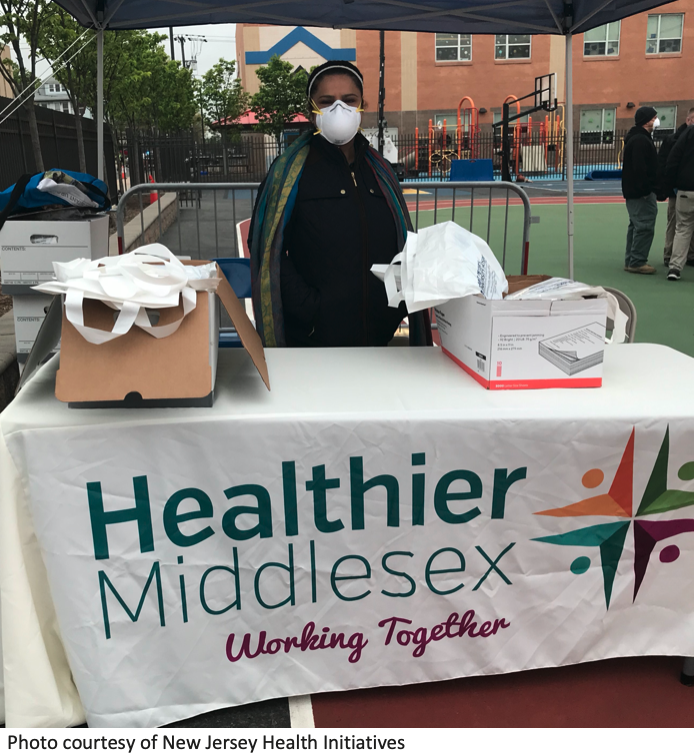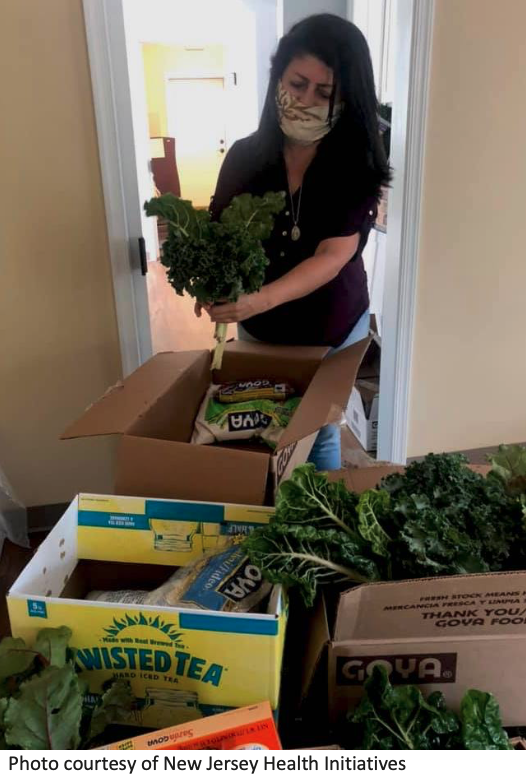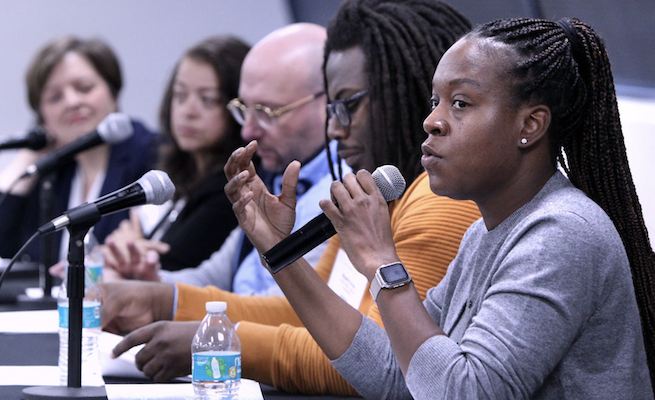Site Search
- resource provided by the Forum Network Knowledgebase.
Search Tip: Search with " " to find exact matches.

There is a plurality of definitions of the term systems change, each contextualized within different cultures and purposes. Doing Good Better embraces systems change as an inter-sector process that addresses complex social problems nonprofits and funders confront with collective action centered on equity, mutual respect, and resilience. Systems change refers to changing the parts and their relationships within a system with the understanding that this change will have ripple effects. As grantmakers, we need to create an environment that enables grantee effectiveness, so they can deliver on their mission. Systems change in philanthropy focuses on structures, policies and processes, resources, values, power, mindsets and, infrastructure that is illustrated in three iterative phases. In time, we hope that the application of this model will result in collective impact and a more resilient social sector for all of New Jersey.
The first phase is structural (operational) change, which involves funders adopting new policies, practices, and resource flows. The second phase is characterized by new relationships and connections that emerge from structural change eschewing old power dynamic practices. Finally, the third phase is transformative change, which occurs when change becomes rooted in organizational culture and mores. We cannot underestimate the length of time and learning at each stage. Achieving transformative change can be a long journey, but it is a learning journey. One grantmaker stated, “One change led to another and another, like dominos. I started to see what people meant by systemic change. New energy and excitement surged among us as hope grew and the cloudy vision of what we wanted became clearer and clearer.”
Although the figure below displays the six developmental stages as linear and distinct, change is unlikely to follow a linear path. Any change in a system will seldom stay fixed at one of these stages but rather will shift back and forth from one stage to another on the path toward the ideal state. We believe just one organization can’t shift the conditions that hold problems in place; we all must share the same perspectives and move the sector together and simultaneously. We call for all of those involved in the sector to work together to build a better and more equitable nonprofit and philanthropy system for all New Jerseyans.
Graphic comes from “The Water of Systems Change” by John Kania, Mark Kramer, and Peter Senge.
Doing Good Better, a partnership of the Council of New Jersey Grantmakers and the New Jersey Center for Nonprofits, is a community of funders and nonprofits taking action against the power imbalances and racial inequities in philanthropy, nonprofits, and government.
Right Size Applications; Simplify Reporting
Affirmation: Paperwork hinders us all.
Duplicative or complex proposal and reporting requirements divert time and resources for both nonprofits and philanthropy, needlessly burdens nonprofit partners and siphons scarce resources away from where they are most needed. Funders can lessen the burden on grantee partners by streamlining the application and reporting processes, especially for repeat grantee partners; decreasing the required data to only the most necessary for decision-making; taking on some of the burden of data collection by gathering data from central repositories such as Candid (formerly GuideStar) and the IRS; and retain and use data already collected from repeat grantees. Funders should require updated information such as annual budget, staffing, board member changes, etc., in their grant applications only when the nonprofit is the only source for this information. Collaborate with other local funders and agree to common GOS application questions and budget templates; streamline tools through technology and offer innovative ways for organizations to apply for and report out on grants; limit written requirements to information that is relevant to the request, and which moves the needle on critical social issues.
Activities
• Reduce rigidity and increase the flexibility of what nonprofits must submit for their applications in creative, egalitarian, and less burdensome ways.
• All funders right-size their application and report requirements relative to the grant amount.
• Shift from reports to conversations or other lower time-intensive means.
• Develop agreed-upon common questions for use across the philanthropy sector for general operating support grant applications.
• Explore the efficacy of using common applications for general operating support grants.
• Change site visits for compliance to goals of learning.
• Consider developing a central data repository for New Jersey nonprofits and funders, where applicants can submit and update basic information once a year, and funders can access the necessary information.
Outcomes
• 75% of funders begin to reduce the size of applications and reports relative to the size of the grant.
• 75% of funders shift from reports to conversations or other lower time-intensive means, like site visits geared to learning and relationship building.
• 50% of funders making general operating support grants accept creative, egalitarian, less burdensome applications including other funders proposals.
• Nonprofits have increased capacity to dedicate time to other activities and efforts.
How to Begin Doing Good Better on Reducing Burden
Learning opportunities
• For funders who do not right-size their applications, what are the barriers to reducing paperwork?
• Who is making the decisions about the application and reporting requirements, and how can they be reached to encourage change? How can we involve more board members of funders in this effort?
• For funders who require reports, determine what is “nice to have” vs. what is needed and used and consider eliminating the rest; what are expeditious ways to collect data including accepting other funders’ reports?
• Which funders who make multi-year grants require a full application for the first year and updates for subsequent years?
Pre-Work
• For funders who already report tailoring their applications, consider how to further simplify processes for grantees; share these practices with other colleagues in philanthropy.
• Learn how information is collected without burdening the applicant.
• Review and implement recommendations already provided by nonprofit networks and philanthropy-serving organizations for concrete examples such as centralized document repositories; allowing nonprofit partners to re-use other proposals and reports; holding check-in meetings in lieu of written reports; and other helpful practices.
• Seek promising practices of funders who use site visits as opportunities to build trust and understand the programs and organizations they support instead of as compliance reviews.
Notes:
See, for example, SMU DataArts (formerly the Cultural Data Project), https://culturaldata.org, a nationwide research and data repository for the arts and cultural community. DataArts serves as a collector and clearinghouse for a wide array of data, which funders can access instead of requiring nonprofits to provide it separately.
This advocacy and civic engagement toolkit is designed for community and public foundations that want to educate and encourage their grantees about getting involved in civic and policy activities to increase organizational capacity and impact. While its primary focus is on the grantmaking activity of these foundations, the toolkit also addresses rules and guidance for policy involvement by foundation officials acting on behalf of their foundations.
Native Voices Rising is a joint research and re-granting project of Native Americans in Philanthropy and Common Counsel Foundation. This report focuses on the practices and challenges of community organizing and advocacy, focusing on the need for increased investment in and sustained support for American Indian, Alaska Native and Native Hawaiian communities.
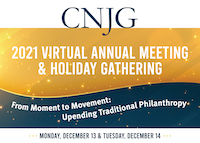
From Moment to Movement: Upending Traditional Philanthropy
Dates & Time:
Monday, December 13 - 2:00 to 3:30 pm -- Annual Meeting Workshop
Tuesday, December 14 - 12:30 to 2:00 pm -- Business Meeting & Keynote Presentation
The Council of New Jersey Grantmakers thanks everyone who attended our 2021 Virtual Annual Meeting & Holiday Gathering.
The 2021 Annual Meeting, From Moment to Movement: Upending Traditional Philanthropy, tackled how we can implement practices based in trust, confront uneven power structures, and advance equity in the philanthropic sector.
Our Annual Meeting Workshop on December 13 explored how two foundations, The Claneil Foundation and Weingart Foundation, are using general operating support, multi-year funding, and transparent communication and feedback to build strong, effective relationships with nonprofit partners. Afterwards, funders discussed where they want to move the needle in their own organization, and the major barriers to implementing those changes.
On Day 2, we heard an inspiring keynote presentation from Marcus Walton, President and CEO of Grantmakers for Effective Organizations (GEO). Marcus kicked off the keynote by sharing critical insights for building trust within and outside your organization. He then engaged in a candid conversation with CNJG President and CEO Maria Vizcarrondo, and answered questions from attendees, on how to reach communities, rethink traditional grantmaking practices, and advance racial equity within philanthropy and New Jersey.
Philanthropy needs to change to meet this moment. Breaking away from ingrained structures and replacing outdated “best practices” with strategies based in trust and power sharing is a long and challenging road for many grantmaking organizations. There will be growing pains. But, during this year’s Annual Meeting & Holiday Gathering, we heard about effective strategies from courageous leaders that have made these changes possible. Join us in 2022 as we continue to rework, reimagine, and operationalize new practices that better serve our partners and communities.
CNJG members can view recordings from the event and additional resources when logged in.
In response to the murders of George Floyd, Breonna Taylor, Tony McDade, Ahmaud Arbery, and countless other Black individuals, we have seen a call to end systemic racism, police brutality, and injustice. To explore philanthropy's role in fighting against racism and injustice, CNJG is sharing information about upcoming programs that we and our Philanthropy-Serving Organizations are presenting and other resources below. While some programs or resources have been organized in direct response to recent protests and calls for action, all are part of a longer conversation on racism in our country and within our sector. As CNJG weaves equity into all of our work, we look forward to continuing these conversations with you.
We realize this is not a comprehensive list, and we are posting items that CNJG staff sees, which is not nearly enough. We ask that our members, especially those who are black and brown, to help us find articles written by, resources created by, and programs led by people of color. Share those resources by emailing us. This page is just a part of our work in equity. We created this page as one starting point for New Jersey’s philanthropic community to engage in conversations, do background reading, attend programs, learn, and take action.
For those members interested in continuing the conversations, we invite you to join our Racial Equity listserve, by emailing Craig Weinrich. On that listserve, members can share information, resources, and opportunities that are helpful to the funding community.
Visit these Websites
Asian Americans/Pacific Islanders in Philanthropy (AAPIP) Resource Directory
This Supporting API Communities Resource Directory was developed to mobilize the philanthropic sector towards meaningful action in the midst of heightened violence and hate targeting Asian American communities.
Participatory Grantmaking
A curated list of resources and articles from Candid on the movement of participatory grantmaking that engages the community in the grantmaking process.
The Power of Asset Framing: A Conversation with Trabian Shorters
This blog post by the Skillman Foundation contains a series of short videos by Trabian Shorters, founder and CEO of BMe Community, who describes shifts in narrative that all philanthropy should consider.
Putting Racism on the Table
This site created by the Washington Regional Association of Grantmakers is the inspiration for CNJG’s Race, Racism and the Ramifications for Philanthropy Series.
Race to Lead Series
A site with reports and surveys on the racial leadership gap in the nonprofit sector.
Stanford Social Innovation Review
The Struggle to Overcome Racism, a list of resources to help leaders of social change and activists.
Trust-Based Philanthropy Project
A peer-to-peer learning and advocacy initiative to make philanthropy more based on trust.
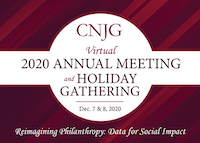
Please Log In to view resources from this event.
Reimagining Philanthropy: Data for Social Impact
Held:
Monday, December 7 - 2:00 to 3:30 pm -- Skill-Building Workshop
Tuesday, December 8 - 12:30 to 2:00 pm -- Business Meeting & Keynote Presentation
Thank you to everyone who attended CNJG’s first ever virtual Annual Meeting & Holiday Gathering. This year’s meeting focused on the many ways philanthropy can use data for social impact.
Data science is a powerful tool to address housing and food insecurity, education inequality, health disparities, civic injustice, and other longstanding social issues that continue to intensify during the pandemic. Building data capacity equips local leaders with information to develop and advocate for more effective policies. New evaluation strategies can outperform outdated processes that reinforce inequities and slow progress. Research and technology that fuels innovation in the private sector can help nonprofit and government organizations drive impact in New Jersey communities..
On Day 1, the Annual Meeting Workshop focused on evaluation and learning practices that center equity and social impact. And on Day 2, Keynote panelists shared how data science can help connect people to services, address racial inequity, and create greater impact in our communities during the pandemic and beyond..
Philanthropy can’t go back to “normal,” because normal wasn’t good enough. During this year’s Virtual 2020 Annual Meeting & Holiday Gathering we explored how we can reimagine philanthropy by harnessing the full power of data for social impact.
The Council of New Jersey Grantmakers would like to thank our sponsors for their generous support: Signature Sponsors – Novartis and PSEG; Sustaining Sponsors – Prudential and Horizon Blue Cross Blue Shield of New Jersey; Collaborating Sponsor – Robert Wood Johnson Foundation; and Performance Sponsor – The Provident Bank Foundation.
During 2023, CNJG gathered benefits information from our members to generate our 2023 New Jersey Philanthropy Benefits & Salary Summary Report. Members tell us that this report is one of the most important and effective benchmarking tools for our field. A statistically significant number of members completed our Benefits Report. We are grateful to those that completed the survey, which is a major investment of time, to help us gather this useful data.
The report consists of two sections:
CNJG Benefits Survey
CNJG and our members want specific data about the benefits offered to their employees, board, and more. Therefore, CNJG created our triennial Benefits Survey that gathered this comprehensive data specific to New Jersey’s grantmaking community.
For the second time in this survey’s history, we asked for board and staff demographic data. As more attention is focused on racial equity in our work, it is helpful to benchmark this data in graphical form. We hope it sparks conversation at your organization.
Council on Foundations (CoF) Salary Survey
The salary survey was administered by our partners, the Council on Foundations. This annual nationwide effort by CoF (with the assistance of other Philanthropy-Serving Organizations across the country) benchmarks the salaries of employees at foundations, corporate giving programs, and other philanthropic organizations. CNJG encourages any and all members to complete this survey each year.
Salary information from CoF presents national, mid-Atlantic, and New Jersey data for over 40 staff positions. Salary ranges are only given for positions with five or more reporting organizations. To report on more New Jersey salary data, we hope more members will complete this annual survey.
CNJG reminds our members and other foundations across New Jersey to complete both surveys when they are available – CoF’s is EVERY YEAR, and CNJG’s is every three years. The more data we and CoF can gather, the better and more accurate the results will be for the philanthropic community both in the state and nationally.
Download the 2023 New Jersey Philanthropy Benefits & Salary Survey Summary Report here. You must be a member of CNJG and logged in to access the report.
CNJG's past Summary Reports may be found on our website:
2020 New Jersey Philanthropy Benefits & Salary Survey Summary Report, released in January 2021
2017 New Jersey Foundation Benefits & Salary Summary Report, released in September 2017
2014 New Jersey Foundation Benefits & Salary Summary Report, released in February 2015
2011 Mid-Atlantic Foundation Benefits & Salary Summary Report, released in June 2012
Small BIPOC organizations and/or historically excluded/led
organizations have greater access to funding.
Affirmation: We must center the most marginalized, underfunded, and impactful organizations.
BIPOC, grassroots, and/or historically excluded1 leaders are the most proximate to the populations and communities that face the most pressing social issues and should be central to designing solutions and funded; yet they are often overlooked or ignored as real change-makers.
They are underinvested in by major funders and are often left to struggle on their own; and when they are funded, grants are small and often highly restricted.
Some funders have artificially high budget requirements, require collaboration with larger “more sophisticated” organizations, won’t fund fiscally sponsored groups, or emphasize leadership requirements that are increasingly out of date or exclude vital lived experience.
Community organizations are exploring innovative and egalitarian management structures, such as co-directorships, collectives, and collaboratives, that do not resemble the constructs of the past.
Leadership comes in all structures, sizes, and identities; funders must seek to recognize and fund those who are doing effective work and re-evaluate their views of accepted leadership patterns. For BIPOC, grassroots, and/or historically excluded leaders to succeed, we must provide flexible resources and professional development support while they are leading.
Activities
Below are activities your organization can engage in that will advance your equity focus
• Agree as a community of practice to a shared definition of BIPOC, grassroots, and/or historically excluded-led organizations to foster a common frame of reference to help guide this work.
• Create networking and referral opportunities for BIPOC, grassroots, and/or historically excluded leaders to expand their access to funding and opportunities similar to that of larger, mainstream groups.
• Invest in the development and pipeline of BIPOC, grassroots, and/or historically excluded leaders.
• Remove funding barriers for small BIPOC, grassroots, and/or historically excluded organizations that have traditionally been precluded from funding because of budget size, leadership structure, auditing requirements, and similar obstacles.
• Actively partner with BIPOC, grassroots, and historically excluded organizations to make funding decisions on issues closest to their communities.
• Provide significant, multi-year, general operating funding to organizations and movements led by BIPOC, grassroots, and/or historically excluded communities.
Short-term Outcomes
• Progress is tracked into addressing the barriers to funding BIPOC, grassroots, and historically excluded-led organizations in NJ.
• A greater number of BIPOC, grassroots, and/or historically excluded-led organizations are funded than before, by new and existing funders.
• Professional development and capacity building as requested by BIPOC, grassroots, and/or historically excluded leaders is funded.
Long-term Outcomes
• BIPOC, grassroots, and/or historically excluded leaders can access funding and opportunities similar to that of larger, mainstream groups.
• A greater percentage of support to organizations and movements led by BIPOC, grassroots, and historically excluded communities is provided as significant, multi-year, general operating funding. In this context, “significant” can refer to both the quantity, size or percentage of grants awarded by the funder in any given year.
How to Begin Doing Good Better on Equity
Learning opportunities
• Which criteria and practices are creating, perpetuating or exacerbating exclusion of BIPOC, grassroots, and or historically excluded-led organizations?
• For funders that exclude or limit funding to small organizations, why are these barriers in place? What biases or missed opportunities are resulting from these obstacles?
• When funders are actively prioritizing BIPOC, grassroots, and historically excluded -led organizations in their philanthropic partnerships, what definitions, outreach, and partnership strategies are being used? How has this evolved based on lessons learned?
Pre-Work
• Funders should become educated about how traditional ways of identifying grantees and other criteria often excludes BIPOC, grassroots, and/or historically excluded-led organizations.
• Actively seek and share ways to center, identify, fund, and partner with applicants or community-based partners to create solutions in all efforts.
• Identify forums or protocols for introductions, dialogue, and relationship-building between funding community and BIPOC, grassroots and/or historically excluded-led organizations to pave the way for ongoing or stronger partnerships.
General Operating Support or General Project Support
Affirmation: Funds with the least restrictions are the most valuable
Nonprofits maintain and strengthen their organizations when their funds are unrestricted. Data shows flexible and reliable funding increases impact when nonprofit leaders have control over how funds flow to meet the needs of their constituents and internal operations, as demonstrated during the pandemic when funders released previously restricted funding. General operating support (GOS) funding signals trust in our partners and can open more honest dialogue about meeting the mutual goals of the funder and nonprofit. Funders who make project or program grants should trust the organization and provide flexible funding within a specific program.
Activities
• Over the short term, funders aim to shift their GOS activity by 30%. (30% more grants shift from program to GOS, or from fully restricted to negotiated GOS.)
• Provide grants as unrestricted organizational general operating support. The long-term ideal is for most, if not all, grants to be 100% GOS, unless a funder is legally precluded from doing otherwise.
• For project/program grants, 100% of the grant awarded is unrestricted (negotiated GOS), applying mission-based and mutually negotiated outcomes.
• Nonprofits articulate their organizational vision, strategies and intended outcomes to funders; funders understand the models of their grantee partners and learn from them how the grantee partner's work will lead to change.
• Trust nonprofit partners to know how to best apply their funding.
• Create a shared understanding of the meaning and importance of full-cost budgeting and real-cost funding.
Short-term Outcomes
• 70% of funders are shifting some of their distribution to making general operating support grants.
• 100% of program/project grants are designated unrestricted.
Long-term Outcomes
• 100% of all grants are made without restrictions, unless limited by covenant or donor wishes in the case of community foundations.
• All nonprofits can clearly articulate their vision, strategies, outcomes, and business models to funders; and funders understand them and trust them to know how best to use their funds.
How to Begin Doing Good Better on Flexibility Learning Opportunities
• Why aren’t some funders planning to award GOS or negotiate GOS?
• Ask funders: If you participated in CNJG’s 2022 funder survey and indicated that you planned to initiate GOS, have you done so? • Why are some grants restricted?
• What would it take for funders to change?
Pre-Work
• Seek and share learning opportunities for funders, prioritizing education of foundation boards, to address the barriers to awarding GOS and understand how restricted funding undermines financial sustainability.
• For funders who already regularly provide GOS funding, educate/advocate for others to do the same.
• Learn how GOS/negotiated GOS strengthens grantee partners and the multiple ways they can use and evaluate GOS. Actively seek insights from nonprofits to reinforce the message about GOS in their funding partnerships.
• As an incremental step for funders that are not receptive to GOS, provide education about negotiated general programming support (flexible funding within a mutually agreed-upon program area, as opposed to organization-wide GOS).
• Share promising practices on evaluation of GOS and negotiated GO
These news articles show our members’ responses to the coronavirus pandemic, including announcements, emails, blogs, grants and other resources. If you have items to add, please email us.
Actions and Announcements
Audible Creates Global Center for Urban Development and Hires Aisha Glover to Help Lead It
Russell Berrie Foundation Post: Our Response to COVID-19
Campbell Soup to pay hourly employees premium during outbreak
Post: Our Response to COVID-19
Geraldine R. Dodge Foundation
Dodge signs CoF pledge
Grunin Foundation 3/13 COVID-19 Announcement and 3/31 COVID-19 Update
Johnson & Johnson’s lead COVID-19 vaccine candidate shots for early 2021 authorization
Robert Wood Johnson Foundation
Culture of Health Blog: Handwashing to Slow the Coronavirus Pandemic
Opinion: Racism is the other virus sweeping America during this pandemic by Julie Morita, M.D
Opinion: Disabled Americans can’t be a COVID-19 afterthought by Dr. Richard Besser
Culture of Health Blog: Incarceration Rates: A Key Measure of Health in America
Opinion: In Covid-19 Crisis, Philanthropy’s Attention Must Focus on People With Disabilities
Brief: Health Equity Principles for State and Local Leaders in Responding, Reopening & Recovering from COVID-19
Culture of Health Blog: Lessons for an Equitable COVID-19 Response and Recovery
Kessler Foundation has produced two COVID related podcasts:
Practical Tips to Help Survive the Pandemic as a Parent of a Child with Autism
COVID-19 and Spinal Cord Injury: Minimizing Risks for Complications
New Jersey Council of Humanities Op-ed: Staying Human During the Pandemic
New Jersey Health Initiatives’ Deputy Director of Programs, and CNJG Board Member Diane Hagerman penned “Collaboration across county lines is key to a healthy New Jersey” on NJ Spotlight.
New Jersey Council for the Humanities and New Jersey Historical Commission present a webinar series for cultural nonprofits navigating the COVID-19 pandemic
New Jersey Economic Development Authority assists more than 10,000 small businesses impacted by COVID-19
New Jersey State Council on the Arts partners with ArtPride New Jersey Foundation on “Keep Jersey Arts Alive” campaign.
Newark Arts and the City of Newark Retools Its Ambitious Arts Grant Program to Respond to COVID-19
Nicholson Foundation Email to Grantees
Nicholson honors their own Colette Lamothe-Galette, lost to COVID-19
OceanFirst Foundation and Grunin Foundation along with Townsquare Media Launch Acts of Kindness Campaign
Subaru teams up with TerraCycle on PPE recycling
Turrell Fund Email to Grantees about CARES Act
Turrell Fund manages new Passaic County Pandemic Partnership hosted at the Community Foundation of New Jersey
United Way of Greater Mercer County Op-ed message from Sandra Toussaint
Valley National Bank offers Community Pledge CD to help donate and save at the same time
Resources
Newark Trust for Education COVID19 Resources
New Jersey State Council on the Arts Resources for Artists and Arts Organizations
Video: Hear from recognizable native New Jersey voices about the importance of donating to the New Jersey Pandemic Relief Fund
PKF O’Connor Davies: Grantmaking During Disasters & Tax-favored Financial Assistance to Employees
In 2003, with member support, CNJG commissioned a report on the impact a potential conversion of Horizon Blue Cross Blue Shield to a for-profit might have on access to health care in New Jersey. Research from the Center for State Health Policy (CSHP) at Rutgers University, provided details about the law governing such conversions in New Jersey and the experience of other states with conversions. The report identified questions raised in other states when such conversions occur, especially about the valuation of assets, the impact on low-income families, and the operation of the philanthropic foundations that have been established as stewards of the assets generated by the conversions. CNJG’s purpose was to seek answers to critical questions relevant to the availability of healthcare coverage for New Jersey’s citizens and to discuss models of best practice for healthcare conversion foundations across the United States.

These articles are curated from news sources, philanthropic-focused publications, philanthropy serving organizations, and other places found on the internet. We encourage philanthropic organizations to read, share, and use the strategies suggested in these articles for your own diversity, equity, and inclusion learning journey. If there are others that you feel we should include, please contact us.
Chronicle of Philanthropy: Philanthropy Pours More Money Into Advancing Economic Wealth of Latinos (10/13/2022)
ABC News: Two New Jersey towns illustrate the race gap in the COVID pandemic (5/13/2022)
Chronicle of Philanthropy: General Operating Support Is Vital to Advancing Equity, Strengthening Nonprofits, Say Leaders (4/18/2022)
MacArthur Foundation: Movement to End Philanthropy’s Complicity in Anti-Blackness (4/18/2022)
Chronicle of Philanthropy: Nearly 500 Foundation Leaders Unite to Push for More Support of Asian Americans (3/26/2021)
Chronicle of Philanthropy: As Violence Against Asian Americans Intensifies, the Moment for Philanthropy to Act Is Now (3/17/2021)
Chronicle of Philanthropy: How One Family Foundation is Evolving to Refocus on Racial Equity (3/16/2021)
HealthDay.com: Many Adults Do Not See Link Between Racism, Poorer Health (1/27/2021)
Stanford Social Innovation Review: How to Begin Considering a Gender Lens Investing Strategy (12/10/2020)
Nonprofit Quarterly: How to Welcome Native Leaders to the Philanthropic Sector (12/3/20)
Chronicle of Philanthropy: Opinion Piece: Diversity Mandates from Foundations Maki It Harder for Nonprofits to Do Their Jobs Well (12/2/2020)
Chronicle of Philanthropy: Invest in and Strengthen People of Color: A Corporate Grant Maker Explains How (11/17/2020)
Nonprofit Quarterly: White House Declares Ban on Federal Racial Equity Trainings (9/14/20)
Nonprofit Quarterly: White Supremacy: Call It By Name (9/14/2020)
Denver Post: How Donors Can Advance Racial Equity (9/14/2020)
ROI-NJ: NJ to recognize Juneteenth as official state holiday (9/11/2020)
Chronicle of Philanthropy: The 'Warping Effects' of Philanthropy (8/25/2020)
Chronicle of Philanthropy: Companies Lead Philanthropic Response to Calls for Racial Justice, but Will It Last? (8/25/2020)
Exponent Philanthropy: Moving Towards Racial Equity in Philanthropy: Introducing an Anti-Racist Intersectional Frame (8/25/2020)
Medium.com: Your 3-Step, Uncomplicated Formula for a More Diverse, Equitable, and Inclusive Workplace (7/30/2020)
Inside Philanthropy: “A Moment of Reckoning.” How Can Funders Support an Equitable and Inclusive Arts Sector? (7/16/2020)
Generocity: Uprising in Philadelphia: A to-do list for the next six months (7/9/2020)
Boston Globe: The Problem is White Supremacy (6/29/2020)
Inside Philanthropy: Amid Demands for Change, Here’s How Philanthropy Can Back Underfunded Black-Led Group (6/18/2020)
Nonprofit Quarterly: This Moment Shows Us Why Philanthropy Should Reinvent Itself by Gislaine Ngounou, of the Nellie Mae Education Foundation (6/17/2020)
Chronicle of Philanthropy: Who Holds Philanthropy Accountable for Racial Justice? by Lisa Pilar Cowan, vice president of Robert Sterling Clark Foundation (6/16/2020)
Creative New Jersey: Summary and resources from their statewide conversation on Racial Justice (6/10/2020)
Chronicle of Philanthropy: 64 Black Foundation Leaders Tell Philanthropy to Go Big in Response to Pandemic and Police Killings (6/10/2020)
Stanford Social Innovation Review: Mass Decarceration, COVID-19, and Justice in America by Deanna Van Buren co-founder of Designing Justice + Designing Spaces and F. Javier Torres-Campos, Thriving Cultures Program Director at Surdna Foundation (6/9/2020)
Communications Network: Crowdsourced Anti-Racism Resources and Tools
NonprofitAF.com: Privilege, power, and personal conflicts: The forces preventing change in nonprofit and philanthropy by Vu Le (6/8/2020)
Philanthropy Network Greater Philadelphia: Articles and Resources from the webinar: The Crisis of White Supremacy in America: What’s Philanthropy’s Role (6/4/2020)
Chronicle of Philanthropy: Dismantling Racism Might Require Philanthropy to Dismantle Itself by Lisa Pilar Cowan, vice president of the Robert Sterling Clark Foundation (6/2/2020)
Chronicle of Philanthropy: Why All Grantmakers Should Seek to Fix Democracy by Suzette Brooks Masters, senior strategist at the Center for Inclusion and Belonging at the American Immigration Council (6/2/2020)
Southern Poverty Law Center: Authoritarian State or Inclusive Democracy? 21 Things We Can Do Right Now by Eric K. Ward, Senior Fellow (6/1/2020)
Nonprofit Quarterly: Dear Philanthropy: These Are the Fires of Anti-Black Racism by Will Cordery of Leverage Philanthropic Partners LLC & Astraea Lesbian Foundation for Justice (6/1/2020)
NonprofitAF.com: Have nonprofit and philanthropy become the "white moderate" that Dr. King warned us about? by Vu Le (6/1/2020)
Library Journal: Books on Anti-Racism (5/31/2020)
Stanford Social Innovation Review: Overcoming the Racial Bias in Philanthropic Funding by Cheryl Dorsey, Peter Kim, Cora Daniels, Lyell Sakaue, & Britt Savage (5/4/2020)
Stanford Social Innovation Review: For a More Equitable America, Understand Race and Racism as Actions We Do and Can Undo by MarYam Hamedani, Hazel Rose Markus & Jeanne Tsai (5/1/2020)
Jacobin Magazine: The Perils of Liberal Philanthropy by Karen Ferguson (11/2018)
Smithsonian Magazine: The 1968 Kerner Commisssion Got It Right, But Nobody Listened by Alice George (3/1/2018)
Continuum Chart on Becoming an Anti-Racist Multicultural Organization by Crossroads Ministry (2013)
The Characteristics of White Supremacy Culture from Dismantling Racism: A Workbook for Social Change Groups (2001)
Resource Generation: Guidance for Giving to Black-led Organizations for Black Liberation (undated)
Prison Policy Initiative: Prison Gerrymandering Project how the Census Bureau counts people in prison (undated)
Excellence in Giving
In 2005, CNJG adopted Guiding Beliefs & Principles to offer a thoughtful source of direction and inspiration to help guide our state’s philanthropic sector into the future. CNJG first launched its Excellence in Giving initiative in 2007 with the goal is to provide grantmakers the practical tools necessary to ensure best practice in their operations and grantmaking.
The first booklet, Guiding Beliefs & Principles for New Jersey Grantmakers includes a wealth of insights and tips related to board governance, legal compliance, grantee communications, fiscal responsibility, public disclosure, and many other key areas of foundation governance and operations. It contains wisdom provided by leaders of all types of giving organizations within the CNJG’s membership, and is intended to serve as a practical resource to assist New Jersey foundations in their grantmaking. CNJG’s board is in the process of updating these beliefs and principles in 2023/2024. For more information on the updating process, please contact Theresa Jacks.
 In 2010 CNJG released a second, comprehensive resource to help the state’s philanthropic community understand their ethical, legal, and fiduciary requirements and obligations - What Every Grantmaker Should Know and Frequently Asked Legal Questions. These two booklets are key publications in CNJG’s Excellence In Giving Series. While the Guiding Beliefs & Principles is available publically, members will need to log into access the legal guide for download.
In 2010 CNJG released a second, comprehensive resource to help the state’s philanthropic community understand their ethical, legal, and fiduciary requirements and obligations - What Every Grantmaker Should Know and Frequently Asked Legal Questions. These two booklets are key publications in CNJG’s Excellence In Giving Series. While the Guiding Beliefs & Principles is available publically, members will need to log into access the legal guide for download.
Members can request additional copies of the booklets mentioned on this page by contacting Theresa Jacks.
Inspiring Change through Leadership: Maximizing Philanthropic Impact
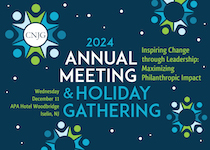 Wednesday, December 11, 2024 - 9:00am to 3:00pm
Wednesday, December 11, 2024 - 9:00am to 3:00pm
Luncheon, Keynote Presentation & Workshop
Location: APA Hotel Woodbridge, 120 Wood Ave S, Iselin, NJ 08830
The Council of New Jersey Grantmakers thanks everyone who attended our 2024 Annual Meeting & Holiday Gathering. On Wednesday, December 11, over 130 Council members and special guests gathered to celebrate the holiday season, welcome new CNJG members, convene our annual business meeting, and feature a dynamic discussion related to the vital work of philanthropy.
The Council’s 2024 Annual Meeting & Holiday Gathering was the place where CNJG members and New Jersey’s philanthropic community came together to share ideas about the important work they’re doing. It also provided a valuable opportunity to connect with colleagues.
This year’s theme, Inspiring Change through Leadership: Maximizing Philanthropic Impact, featured keynote speaker Amalia Brindis Delgado of the Panta Rhea Foundation.
The Annual Meeting included a workshop that explored the New Jersey Principles for Philanthropy. An overview of the Principles was presented, followed by a panel of fellow CNJG members who discussed how they are already using the Principles within their organizations. Attendees also had time to discuss how they could leverage the New Jersey Principles for Philanthropy to make changes within their own organizations.
Annual Meeting Photos







